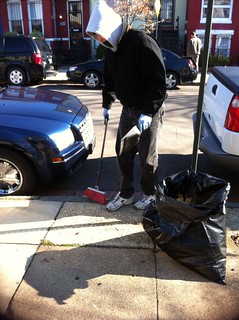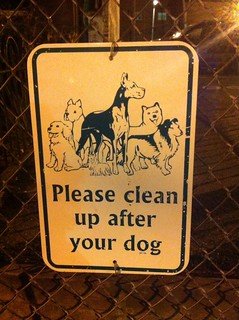Since this blog is going to end soon I decided to do something a little different. This is a much longer post than normal, regardless I hope you enjoy it.
Brian Bakke and Monsignor James Watkins have much in common. They both are men of faith, similar in ages, who moved to Shaw 12 years ago. Both have taken to cleaning up their part of Shaw and have observed the changes in the neighborhood while regularly picking up trash from the sidewalks and the streets.
The reasons why they began picking up trash differ.
When Father Watkins came to Immaculate Conception Catholic Church in Shaw from St. Matthew’s Cathedral in 2001 he noticed, “a tremendous amount of trash. All over the sidewalks and curbs and properties.” The building for Center City Charter School, adjacent to the church, used to house Immaculate’s Catholic school back then and the children had to walk through the trash to get to school. The trash the children and their parents had to step in and over were used needles and condoms and broken glass. Watkins said, “I just thought, for the safety of the children and their sense of pride in their church and school,” and thus he began removing trash from their path, for their safety. Using parish funds, he had eight trash canisters placed along the 1300 block of 8th St. and on N Street NW, near the church. These aid in his campaign against trash.
Brian began cleaning up his neighborhood streets long before coming to Washington. He and his wife moved to a street in Chicago that was the dividing line between two opposing street gangs. The gang members would throw bricks and bottles at cars to draw out rival members to try to kill them. Brian wanted to stop it, so he went hunting for the projectiles used to start fights: the rocks and the bottles, and found them on tires of parked cars, near trees on the sidewalk, and began picking and throwing them away. He recalled the gang members’ reaction, “I overheard them saying, ‘He’s picking up our stuff!'” It should be noted that Brian is 6’6″, over 200 lbs, a former college football player and he can only recall being challenged by women who question his efforts. With a broom and wearing dark clothing as he does, he is a fairly intimidating looking character.
In 2001 Brian and his wife moved to DC, as renters. Compared to where they used to live in Chicago, Shaw, even with its problems “was nothing.” Arriving, he “asked God about this. How does a white man enter an all black neighborhood, or predominately black neighborhood?” His prayers were answered with a phrase, “Go get a broom, use it,” followed later by, “And be silent until someone speaks to you.” Quietly Brian began picking up trash and throwing it into black contractor bags on the 1600 block of 4th St. NW. Slowly he has expanded his area to include the 400 block of R St up to 5th St and around Florida Ave NW. Despite Shaw being less dangerous than Chicago, he still found weapons, “I’ve collected a number of knives, scary ones,” along with other objects.
Both men make prayer a part of their trash removal efforts. Fr. Watkins prays the rosary while sweeping and Brian prays for the drug dealers, the people in the houses and for himself. “I love to pray the rosary*,” Watkins admits with some enthusiasm. When he picks up and sweeps the sidewalks, which he does at least once a day, he can pray 3 rosaries at 15 minutes each, reflecting and praying for intercessions for the parish and himself. He said he’s not big on praying the rosary while sitting in a quiet space, but rather while he’s doing other things so that his prayers are infused with his work. For Brian, a Protestant, prayer pervades his cleaning activities, as well. “When I’m out sweeping, ” Brian said, “I’m usually talking with God or arguing with God, or shouting at God,” quietly, as to not to scare the pedestrians. “I try to be in prayer the whole time, and I’m not always successful. Actually a lot of time, I’m really struggling with my own dirtiness. My own brokenness. The Bible would call it sin. I’m a mess just like everyone else.” Intertwined in these prayers, conversations and internal struggles is that bit of neighborhood activism that sent Brian out to the streets in Chicago. Here, drug dealing is the problem, so here he sweeps up the dime bags. He takes up the humble position of servant and cleans under the drug dealer’s car and sweeps quietly around the dealer, as it is, “just a cheap excuse to just keep praying and praying and praying until he [the drug dealer] leaves. That’s been wonderful to see that happen. Of course, they keep coming back. So…. ” Then he reflects, “the Bible reminds me that I need to be relentless and paints the beautiful picture of the old woman who flies at the judge ’cause she’s been denied justice.** And that’s [how] God wants us to approach this.”
Being out on the streets, cleaning up as often as they do, they have found it to be a great way to meet and really get to know their neighbors. “I meet people,” Fr. Watkins put it, ” I could stay inside my house all day, or inside the church or I could go off in the car.. But to be on the streets, you bump into the parents dropping of the kids at the school.” He adds, “It gives me a chance to chat with people along the way. I get to know them by name, otherwise I would never know some of the neighbors around us. So it [the street cleaning] serves a lot of other purposes which benefit me personally, and the parish.”
The way of the broom was Brian’s method for first getting to know his then black neighbors. As the demographics in the neighborhood have changed he now sees his role changed from ‘new comer’ to ‘connector’, linking the now new people to the older neighbors or groups or whatever in the neighborhood that would help the newer, and typically younger residents find that desired connection where they live. Brian is typically out on Sunday mornings, so regularly that it has become like office hours. People have said to him, “I know that I could find you out here on Sunday. I just had to walk around until I saw you. So anyway, can I talk to you…” The conversations are not forced and they flow freely. From my own experience and talking with neighbors, there have been some deep thought provoking conversations out there on the sidewalks, the kind of talks that you used to have in college at 2AM. Brian has also been good company for sharing a joke or passing along general information.
Besides seeing demographic changes, they’ve seen changes in what gets dumped on the sidewalk and in the streets. Watkins notes that 2005 was the year the needles disappeared. When Brian started, there were more used diapers. He finds fewer hair extensions, which he considers a creepy kind of litter in the way it clings to the sidewalk like a starfish, and then hops on to his broom as if it had a life of its own. As the neighborhood changed, not just in who moved in and who moved out, but in how people used the spaces in the neighborhood, the men have made progress in the war on trash. With the construction of the City Market at O project, some groups no longer hang out or ‘party’ as frequently as they did before on 8th St., leaving empty Patron bottles or other evidence of the night’s activities, that become the morning’s trash.
Though changes in the neighborhood reduced most trash, it introduced another kind of refuse, poop. Canine fecal matter arrived about 6 years ago. Brian mentioned how the presence of dog walkers helps reduce crime, but yes, there are a lot more droppings. Fr. Watkins responded to the problem by placing reminders along 8th for dog walkers to pick up after their pets. He’s gotten positive feedback from owners as the signs communicate a tasteful and positive message.
At some level the men would like others to take ownership of their own patch of sidewalk or block. Watkins wishes people would take responsibility for their property, take care about the way it is presented and develop a sense of community pride. “DC would be a different place if people took on a greater ownership of the spaces where they live, work and play,” says Brian. He later added, “There is an appalling lack of public ownership. Some theologians and philosophers call it the ‘public good,’ or the ‘greater good’.”
There is no guarantee that if you began cleaning up your street or block tomorrow that you will meet and really get to know your neighbors. Nor is it recommended that you go out and directly confront drug dealers with a broom and dustpan. But if everyone were to lay claim to their yard and the sidewalks in front, eliminating the signs of chaos, DC would definitely be a different place, a better place.
*A rosary is a form of devotion in which five, or fifteen, decades (set of ten) of Hail Marys are repeated, each decade preceded by an Our Father and followed by a Glory Be. Typically practiced by Roman Catholics.
**Luke 18:1-8. See the parable of the persistent widow.



